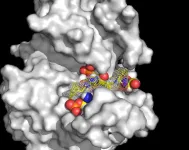(Press-News.org) A new article published in Nature Reviews Disease Primers underscores the profound role that stigma can play in health care -- and how addressing stigma-related barriers can significantly improve health outcomes for individuals and communities around the world.
“Stigma has harmful effects on health, equity and justice,” says lead author Carmen Logie, a professor at the University of Toronto’s Factor-Inwentash Faculty of Social Work (FIFSW). "And while we need more rigorous evaluation of interventions to reduce health-care stigma, we certainly know enough to begin to confront it.”
Logie and her co-author Laura Nyblade, a fellow at the Social, Statistical and Environmental Sciences, Research Triangle Institute in Washington DC, argue that health-care providers need to be able to identify what drives stigma in health-care settings, so they can take action to address stigmatizing practices as well as internalized, anticipated or perceived stigmatization on behalf of those in need of care.
Stigma can play a huge role in health outcomes, say the researchers. For example, health-care providers who view weight as a moral issue or lack of personal willpower, may use stigmatizing language in conversation with patients, contributing to their disengagement from care. People who use drugs may be deemed “junkies”, blamed for their substance use and denied services. In some regions, gender-based stigma has resulted in coerced sterilization and lack of informed choices around contraception and education for women living with HIV.
The good news, say Logie and Nyblade, is that health-care settings are well positioned to identify what drives stigma and make changes to address it through evidence-based approaches. To start, health-care providers can examine misconceptions about disease transmission and infection control, and then make needed changes to institutional policies and practices. “Increasing health providers’ awareness of how stigma is appearing in the ways they deliver services is key,” says Logie, who is also Canada Research Chair in Global Health Equity and Social Justice with Marginalized Populations.
In Ghana, for example, staff training and activities to reduce fear of HIV infection was shown to improve the caregivers’ willingness to provide services to people with HIV. In Tanzania, stigmatizing beliefs held by HIV clinic staff around substance use was reduced through interventions that addressed commonly held misconceptions. The interventions also successfully conveyed the impact that stigmatizing language used by health-care providers can have on their patients.
The researchers argue that relationship building and partnerships between health care providers and communities can enhance the ability of both professionals and their clients to strengthen social cohesion, collective resilience and coping strategies. Social movements and dates of significance, such as weight inclusivity movements and World AIDS Day, are examples of ways that people have come together to advocate for awareness and promote change.
“These approaches move beyond the focus on stigma victimization to recognize and celebrate the strengths of communities who have been marginalized, as well as social histories of mutual support and stigma resistance,” says Nyblade.
Investing in stigma reduction in health care systems will yield results across the care continuum, and should be supported by governments, health-care institution polices, and licensing bodies, conclude the authors.
“All types and levels of health-care providers need to be engaged in stigma reduction, through the training curriculums, continuing education programs, and more” says Logie. “The time to act is now.”
In addition to her role at FIFSW, Logie is affiliated with the United Nations University Institute for Water, Environment and Health, and the Women’s College Research Insitute at Women’s College Hospital in Toronto.
END
Stigma has a profound impact on health outcomes must be addressed
Investing in stigma reduction in health care systems will yield results across the care continuum, and should be supported by governments, health-care institution polices, and licensing bodies, say researchers
2024-10-07
ELSE PRESS RELEASES FROM THIS DATE:
Has the affordable care act’s dependent coverage expansion benefited young adults diagnosed with cancer?
2024-10-07
The federal Patient Protection and Affordable Care Act (ACA) passed in 2010 includes a Dependent Coverage Expansion (DCE) provision that permits dependents to remain on their parents’ health insurance plans from age 19 to 25 years, the age group that has historically had the highest uninsured rate in the United States. A recent analysis reveals that during the ACA’s first decade, survival rates of DCE-eligible young adults with cancer have improved. The findings are published by Wiley online in CANCER, a peer-reviewed journal of the American Cancer Society.
To examine whether young adults with cancer diagnoses have ...
A new study reveals a key mechanism driving atherosclerosis in Hutchinson-Gilford Progeria Syndrome
2024-10-07
A team of researchers from the Centro Nacional de Investigaciones Cardiovasculares Carlos III (CNIC), the Centro de Investigaciones Biológicas Margarita Salas (CIB-CSIC), and the Instituto de Ciencias de Materiales de Madrid (ICMM-CSIC) has made a significant breakthrough in understanding the underlying causes of cardiovascular disease in patients with Hutchinson-Gilford progeria syndrome (HGPS), an ultra-rare genetic disorder that accelerates the aging process. The most serious consequence of HGPS is the early onset of cardiovascular disease, leading to premature death at an average age of 14.5 years.
The study was led by Dr. Vicente Andrés, ...
HPV vaccination switch to 1-dose gender-neutral approach
2024-10-07
Canadian vaccination programs could switch to a 1-dose gender-neutral human papillomavirus (HPV) vaccination approach and eliminate cervical cancer, suggests new modelling in CMAJ (Canadian Medical Association Journal) https://www.cmaj.ca/lookup/doi/10.1503/cmaj.240787.
“Our results have important policy implications in Canada, and in other similar high-income countries evaluating whether to switch to 1-dose HPV vaccination,” writes Dr. Marc Brisson, a full professor at Laval University, Québec, and director of the Mathematical Modeling and Health Economics of Infectious Diseases Lab at the ...
Scurvy: Not just an 18th-century sailors’ disease
2024-10-07
Scurvy, or vitamin C deficiency, is not just an 18th-century seafarers’ disease, as a case study of a 65-year-old woman with mobility issues and social isolation shows. In an article published in CMAJ (Canadian Medical Association Journal) https://www.cmaj.ca/lookup/doi/10.1503/cmaj.240769, clinicians describe how scurvy should be considered in patients with abnormal bleeding and nonspecific symptoms.
The patient visited the emergency department at a downtown Toronto hospital for leg pain and weakness, skin lesions, and discoloration. She also had several chronic health ...
Scientists discover a secret to regulating our body clock, offering new approach to end jet lag
2024-10-07
Singapore, 7 October 2024—Scientists from Duke-NUS Medical School and the University of California, Santa Cruz, have discovered the secret to regulating our internal clock. They identified that this regulator sits right at the tail end of Casein Kinase 1 delta (CK1δ), a protein which acts as a pace setter for our internal biological clock or the natural 24-hour cycles that control sleep-wake patterns and other daily functions, known as circadian rhythm.
Published in the journal PNAS, their findings could ...
Impact of pollutants on pollinators, and how neural circuits adapt to temperature changes
2024-10-04
The Kavli Foundation and the U.S. National Science Foundation are collaborating to accelerate research in the emerging field of neurobiology in changing ecosystems, stemming from the foundation’s efforts in this area first announced in 2023. A joint Kavli-NSF grantmaking program was launched in December of 2023.
Building on early success of this program, Kavli and NSF announce its continuation with a second call for proposals, open through February 10, 2025, for projects tackling hard problems in this understudied field.
Research ...
Researchers seek to improve advanced pain management using AI for drug discovery
2024-10-04
An estimated one in five Americans live with chronic pain and current treatment options leave much to be desired. Feixiong Cheng, PhD, Director of Cleveland Clinic’s Genome Center, and IBM are using artificial intelligence (AI) for drug discovery in advanced pain management. The team’s deep-learning framework identified multiple gut microbiome-derived metabolites and FDA-approved drugs that can be repurposed to select non-addictive, non-opioid options to treat chronic pain.
The findings, published in Cell Press, represent one of many ways the organizations' Discovery Accelerator partnership is helping ...
‘Neutron Nexus’ brings universities, ORNL together to advance science
2024-10-04
Oak Ridge National Laboratory has launched its Neutron Nexus pilot program with Florida Agricultural & Mechanical University, or FAMU, and Florida State University, or FSU, through the FAMU-FSU College of Engineering. The first program of its kind nationwide, it’s aimed at broadening and diversifying the scientific user community with outreach to universities and colleges to increase collaboration and, ultimately, scientific advancement.
Although a recently planned two-day “ORNL Days” event in Florida was cut ...
Early release from NEJM Evidence
2024-10-04
This article was published Early Release to coincide with a presentation at the Symposium on Advanced Wound Care in Las Vegas, NV.
Full text is now available on evidence.nejm.org. Email mediarelations@nejm.org for access.
Original Article: Intact Fish Skin Graft to Treat Deep Diabetic Foot Ulcers
Dured Dardari, M.D, Ph.D., From the Diabetology Department, Center Hopitalier Sud Francilien, Corbeil-Essonnes, France, and the LBEPS, Université d’Evry, IRBA, Université Paris Saclay, 91025 Evry, France.
If you have any questions for our office, please contact our Media Relations ...
UMass Amherst astronomer leads science team helping to develop billion-dollar NASA satellite mission concept
2024-10-04
October 4, 2024
UMass Amherst Astronomer Leads Science Team Helping to Develop Billion-Dollar NASA Satellite Mission Concept
Alexandra Pope, science lead for the PRIMA space telescope, is on team developing next-generation space probe that will explore evolution of the universe
AMHERST, Mass. – A University of Massachusetts astronomy professor is science lead on a $5 million proposal selected by NASA to develop new space satellite missions that bridge gaps in our understanding of the evolution of ...
LAST 30 PRESS RELEASES:
Differing immune responses in infants may explain increased severity of RSV over SARS-CoV-2
The invisible hand of climate change: How extreme heat dictates who is born
Surprising culprit leads to chronic rejection of transplanted lungs, hearts
Study explains how ketogenic diets prevent seizures
New approach to qualifying nuclear reactor components rolling out this year
U.S. medical care is improving, but cost and health differ depending on disease
AI challenges lithography and provides solutions
Can AI make society less selfish?
UC Irvine researchers expose critical security vulnerability in autonomous drones
Changes in smoking status and their associations with risk of Parkinson’s, death
In football players with repeated head impacts, inflammation related to brain changes
Being an early bird, getting more physical activity linked to lower risk of ALS
The Lancet: Single daily pill shows promise as replacement for complex, multi-tablet HIV treatment regimens
Single daily pill shows promise as replacement for complex, multi-tablet HIV treatment regimens
Black Americans face increasingly higher risk of gun homicide death than White Americans
Flagging claims about cancer treatment on social media as potentially false might help reduce spreading of misinformation, per online experiment with 1,051 US adults
Yawns in healthy fetuses might indicate mild distress
Conservation agriculture, including no-dig, crop-rotation and mulching methods, reduces water runoff and soil loss and boosts crop yield by as much as 122%, in Ethiopian trial
Tropical flowers are blooming weeks later than they used to through climate change
Risk of whale entanglement in fishing gear tied to size of cool-water habitat
Climate change could fragment habitat for monarch butterflies, disrupting mass migration
Neurosurgeons are really good at removing brain tumors, and they’re about to get even better
Almost 1-in-3 American adolescents has diabetes or prediabetes, with waist-to-height ratio the strongest independent predictor of prediabetes/diabetes, reveals survey of 1,998 adolescents (10-19 years
Researchers sharpen understanding of how the body responds to energy demands from exercise
New “lock-and-key” chemistry
Benzodiazepine use declines across the U.S., led by reductions in older adults
How recycled sewage could make the moon or Mars suitable for growing crops
Don’t Panic: ‘Humanity’s Last Exam’ has begun
A robust new telecom qubit in silicon
Vertebrate paleontology has a numbers problem. Computer vision can help
[Press-News.org] Stigma has a profound impact on health outcomes must be addressedInvesting in stigma reduction in health care systems will yield results across the care continuum, and should be supported by governments, health-care institution polices, and licensing bodies, say researchers




